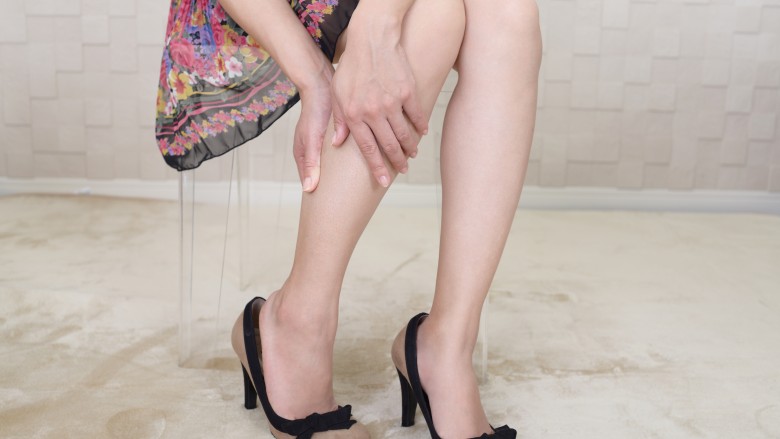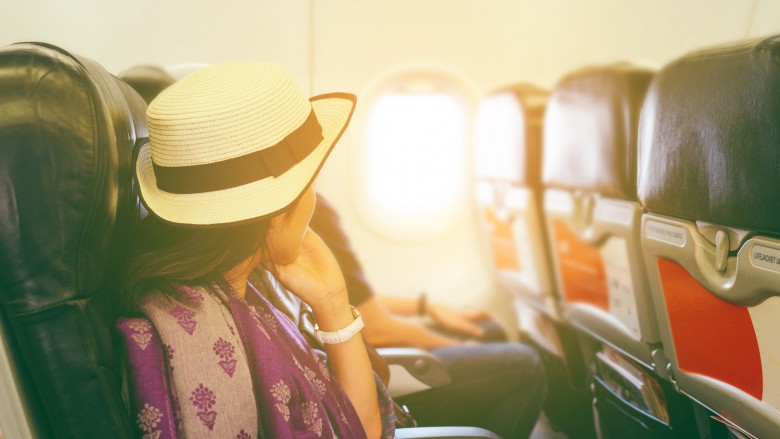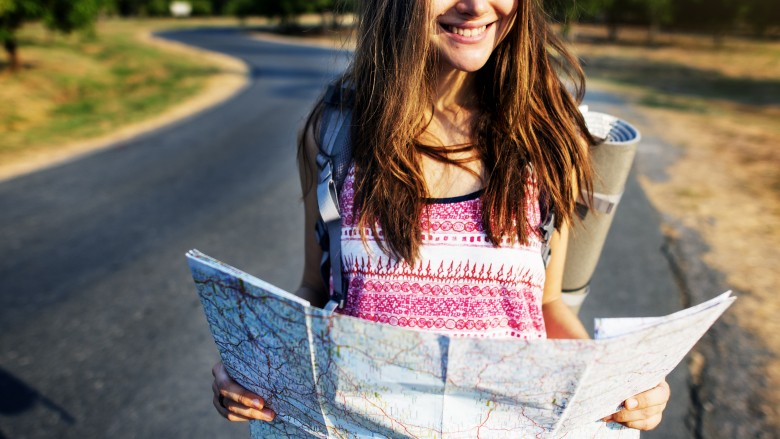What Really Happens To Your Body When You Travel The World
We may receive a commission on purchases made from links.
Traveling is always something I've enjoyed. I love seeing new places, meeting new people, and experiencing the sometimes vastly different customs and cultures that other countries have to offer. However, I hate flying.
As a child, I was just afraid that my plane would crash, but as I traveled more frequently, flying just became synonymous with jet lag, and who really enjoys that? Unfortunately, frequent travel carries more risks to your health than jet lag alone.
I spoke with Svetlana Kogan, M.D. and author of Diet Slave No More, about what to expect before you fly, drive, whatever — to make sure you know what you could be putting your body through to get to your next destination.
Blood clots
Sitting in cramped spaces for a long period of time is not just annoying and uncomfortable — it can also cause blood clots. Dr. Kogan told me that with airplane travel, "the changes in altitude activates the protein which activates clotting cascade in predisposed people. Car travel compresses femoral veins causing venous blood stasis and clot formation, though to a much lesser degree than an airplane does."
If you have a history of blood clots, she says that you should consult with your doctor for prescription medication for prevention of blood clots due to air travel. Fortunately, there are easy things you can do to help prevent blood clots when you travel. "For both air travel and car travel, try to get up and move around as much as possible," said Dr. Kogan. "Getting up every 30 minutes and walking back and forth, will also help to prevent sciatica, lumbago, and arthritic pains." And if you are a healthy person without any history of blood clots, she told me that taking a regular aspirin the day before air travel, the day of the air travel, and for two days after the air travel should be sufficient to prevent blood clots from forming.
Not sure if you're at risk for blood clots? If you're on birth control, a smoker, or have recently had surgery, do consult with a physician before you travel.
Infections
The general problem with travel, according to Dr. Kogan, is exposure to infections. "I almost always see patients with respiratory disease immediately after traveling to or from destination," she said. "Whether you are on a plane, or on a bus or a train — you are inside a 'petri-dish' of human viruses and bacteria."
Additionally, she said that she sees many patients about traveler's diarrhea after they've arrived from Caribbean travel destinations, and particularly from Dominican Republic. "This is usually due to drinking local water or eating things cooked in local water," she said, so if you are traveling to those places, make sure you're taking steps to protect and prevent yourself from traveler's diarrhea.
Another way to prevent getting infections like respiratory disease, Dr. Kogan told me, is to make sure to wear "a simple nursing mask as soon as the plane is boarded and wipe all the handles and surfaces with Lysol wipes before you touch them."
Radiation
One of the biggest problems about people traveling, Dr. Kogan told me, is that people can be pretty clueless about this dangers of flying. For example, did you know that everyone who has ever flown in a plane has had radiation exposure? This is dangerous, especially for pregnant women, because fetuses that are exposed to radiation could suffer health problems in the future.
Unfortunately, a lot of people may not even be aware that they're being exposed to radiation when they travel. In fact, according to Dr. Kogan, "one round trip flight from New York to Los Angeles exposes you to the same amount of radiation as you would receive in one chest x-ray!"
So, if you're pregnant and traveling by plane, do check in with your physician to make sure you're cleared for takeoff.
Insomnia
Another thing to look out for — and something that has affected me personally during and after travel — is insomnia. Call it a part of jet lag, but I feel like the further you travel, the harder it is to adjust to sleep when it's dictated by an entirely different timezone. For example, I've traveled quite a bit to the Philippines, from Canada, because that's where I'm from originally. However, fun as it is to jet off to a warm, sunny destination, the 12-hour time difference can really throw off my sleep patterns, since the difference in times is so severe.
"Frequent travel throws of our circadian rhythms and causes insomnia," said Dr. Kogan, "which in turn leads to fatigue, anxiety, and irritability." So, if you're traveling to a place with a completely different timezone, one way to combat insomnia is to nap when you're tired. "Naps reduce sleep debt, and can help you get in sync with the timezone you're in."
Arthritis
If you don't already have arthritis — you don't have to worry too much about it when you're traveling. "Frequent travel does not increase the risk for osteoarthritis at all," Dr. Kogan told me. However, "it does exacerbate the pain due to stiffness, due to immobility, compression, and decreased circulation and lymphatic drainage." This means that if you do already have arthritis, you need to be aware that long travel can create some problems for you.
To ensure that you experience minimal discomfort when traveling, make sure you've packed any medications you take to relieve your arthritis symptoms. Also, "listen to your body," said Dr. Kogan. Because people have a tendency of over-doing it when they travel, you could be risking pain and injury if you, say, go for a long hike, or physically exert yourself past what you would normally do. Just take your time and rest if you need to.
Remember, it's not a race, it's a vacation!
Acne
Have you ever noticed the changes your skin, post-plane ride? I almost always get off a plane with a new, red souvenir, and while part of it can be related to stress, a lot of it is because of the dryness of the air inside airplanes.
"Dry skin reacts to dry air by becoming even drier, which can trap oils in your skin and cause a breakout," said Dr. Kogan. "If you have oily skin, it's likely to get oilier, because your skin is trying to protect itself from the dry air. That can cause a breakout, too."
So, if you're traveling and want to try and avoid a breakout, make sure that you're thoroughly cleansing your face before, during, and after your flight. It may also be helpful to pack an in-case-of-emergency spot treatment because, unfortunately, you never know.
Travel by cruise ship
If all of this so far has put you off the idea of traveling ever again, I apologize. However, there are "healthier" travel alternatives out there! The next time you plan a vacation, you should seriously consider taking a cruise.
According to Dr. Kogan, on a cruise ship, the damage to the body is practically non-existent. "Your cerebellum, which is the part of the brain responsible for maintaining the balance, together with the inner ear — both get adjusted to the motion sickness challenge," she said. "The person is fully mobile and there is no challenge posed by the changes in the altitude — so I look very favorably upon this way of traveling."
However, she also said that most people tend to overeat on cruise ships due to unlimited food available and huge portions, so she does notice some "sugar, cholesterol, and BP spikes," which may not be the best thing for people with diabetes and hypertension.
It's not all bad
Travel, especially for extended periods of time, can actually affect your personality and make you more open to change and new experiences. If you really think about it, this makes perfect sense, because being in an unfamiliar place and being forced out of your comfort zone can make you more comfortable experiencing new things in the long run.
If you travel often, encountering new things can change your perspective, because instead of coming at these situations (like new, foreign foods, for example) with unease and anxiety, people who travel a lot are usually more open and willing to accept things that deviate from their routines back home. So if one of your goals is to get out of your comfort zone, traveling might be just what you need to achieve that.
Go ahead, enjoy yourself!
Everything in life has its risks, but remember that it also has its rewards. Despite the potential health risks, though, traveling is still a wonderful privilege, and those who are able to do it frequently should count themselves lucky. Don't get me wrong, I still complain about delayed flights and not having enough leg room, but at the end of the day, the sorts of luxuries (like travel) that modern technologies have afforded us are pretty amazing, right?
Some of the best life experiences I've had so far have involved travel, and I think that if it's something you've been dreaming of doing, you should definitely go for it.









